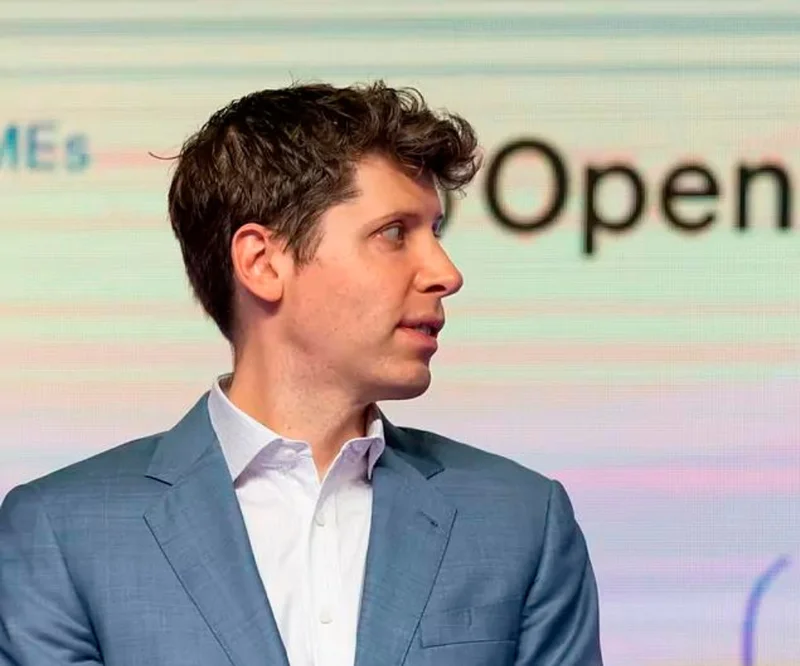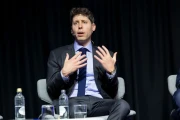When Sam Altman, the man at the helm of OpenAI, made headlines with the sto...
2025-10-12 4 sam altman
So Satya Nadella logs onto X, the platform formerly known as the good one, and drops a video. No big press release, no flashy event with smoke machines and a rented-out stadium. Just a casual video, probably shot on an iPhone, announcing that Microsoft is firing up a new AI supercomputer with over 4,600 of Nvidia's shiniest new GPUs.
He calls it an "AI factory."
Let's be real. This wasn't some spontaneous burst of nerdy excitement. This was a calculated, passive-aggressive digital slap aimed squarely at one person: Sam Altman. The timing, just days after the OpenAI CEO was making headlines with his own massive data center deals, is so obvious it’s almost insulting. It's the corporate equivalent of seeing your buddy post a picture of his new Toyota and immediately posting a video of you revving the engine of your new Ferrari in his driveway.
This isn't innovation. It's a flex.
You have to appreciate the sheer audacity of it. Nadella, with the calm demeanor of a chess grandmaster, essentially told the entire tech world, "Oh, you're all talking about building the future of AI? That's cute. We already built the foundation, poured the concrete, and we own the damn land it sits on."
The language is perfect PR-speak, designed to sound revolutionary while saying very little. "AI factories." Give me a break. These are data centers. Giant, power-guzzling warehouses filled with humming racks of silicon that get hotter than the surface of the sun. Calling them "factories" is a slick marketing trick to make them sound productive and industrious, like they're churning out widgets for the betterment of humanity. What they’re really churning out is unimaginable electricity bills and a new, terrifying concentration of power.
This whole spectacle is like watching two tech billionaires argue over who has the bigger superyacht. The boats are just proxies for power, and in this case, the GPUs are the measurement. Nadella didn't just announce a new toy; he announced the first of many. He casually mentioned scaling up to "hundreds of thousands" of these GPUs. That’s not a plan; that’s a threat. It's a reminder to Altman, and everyone else from Google to Amazon, that while they're all scrambling to buy the shovels for the AI gold rush, Microsoft already owns the mine.
What was the internal meeting like before Nadella hit "post"? Was it a meticulously planned communications strategy, or just a moment of executive pique? And does anyone, anywhere in that glass tower in Redmond, ever stop to ask if building hundreds of thousands of these power-draining "factories" is, you know, a good idea for the planet they’re supposedly trying to improve? Offcourse not.
The Microsoft-OpenAI relationship has always been the weirdest soap opera in Silicon Valley. Microsoft isn't just an investor; it’s OpenAI’s landlord, sugar daddy, and biggest frenemy all rolled into one. OpenAI runs on Microsoft's Azure cloud. That massive, multi-billion dollar "partnership" is basically OpenAI paying its allowance right back to its parent company for rent.

So when Sam Altman starts talking about raising a trillion dollars to build his own global network of AI chip fabs and data centers, you can practically hear the record scratch in Nadella's office. A trillion dollars isn't just an investment; it's a declaration of independence. It's the kid living in the basement telling his parents he's about to buy the entire neighborhood.
Nadella's video was the calm, parental response: "That's a lovely dream, son. Now remember to take out the trash. By the way, I just upgraded the entire electrical grid for the house, so don't you worry your pretty little head about it."
This is a bad situation. No, 'bad' doesn't cover it—this is a five-alarm strategic entanglement. Microsoft has OpenAI right where it wants it: completely and utterly dependent. Every brilliant model OpenAI creates only serves to make Microsoft's Azure platform more indispensable. Microsoft gets to sell the picks and shovels and gets a piece of the gold that's found. It's a genius business model, but it ain't a partnership of equals.
Microsoft boasts about its 300+ data centers in 34 countries making it "uniquely positioned." Satya Nadella seems to be reminding everyone, including OpenAI CEO Sam Altman, how Microsoft is ‘uniquely - The Times of India. And they’re right. But for a company that fumbled the bag on search, mobile, and social media, you can tell they're terrified of letting this one slip. They’re not just building a moat; they’re trying to boil the oceans so no one else can even get close to their castle. And OpenAI is the beautiful, brilliant princess trapped in the tallest tower, dreaming of one day owning her own kingdom. This whole dynamic reminds me of my cable company, which "partners" with me by providing internet while finding new and creative ways to charge me for it every month. Some partnership.
When you strip away the flowery language about "democratizing AI" and "empowering humanity," what's left? A cold, hard power struggle. This isn't just about Microsoft putting its ambitious partner in its place. This is about ensuring that the next technological revolution—the one that might be bigger than the internet and the smartphone combined—flows through Microsoft’s pipes.
Nadella is playing a different game than everyone else. While others are focused on building the smartest AI, he’s focused on building the biggest cage to keep it in. By scaling to hundreds of thousands of the most advanced GPUs on the planet, he’s creating a level of infrastructural gravity that could become impossible to escape. He wants to be the sole landlord in a world where every single company, from scrappy startups to OpenAI itself, has to pay him rent.
The quiet part of this whole affair is what happens when the tenant gets too big for the house. What happens when OpenAI's next model is so powerful it can create a competing operating system, a better search engine, or a more efficient suite of office software? At what point does the "partner" become the "existential threat"? Does the landlord finally evict the tenant?
Then again, maybe I'm the crazy one. Maybe this is all just healthy competition, and I’m just a jaded columnist reading palace intrigue into a simple corporate update. Maybe they're all holding hands and singing kumbaya as they build our glorious AI-powered future.
Yeah. And maybe I'll start believing in the tooth fairy again.
Look, forget the utopian nonsense about AI changing the world for the better. This announcement wasn't for us. It was a memo, delivered via social media, from a landlord to his most important, and most dangerous, tenant. It’s Satya Nadella reminding Sam Altman who owns the servers, who pays the power bills, and who can, if things get dicey, turn off the lights. All this talk of "AI factories" is just a pretty new coat of paint on a very old, very simple game: the guy with the most hardware makes the rules. And Microsoft just made it terrifyingly clear who that is.
Tags: sam altman
Related Articles

When Sam Altman, the man at the helm of OpenAI, made headlines with the sto...
2025-10-12 4 sam altman